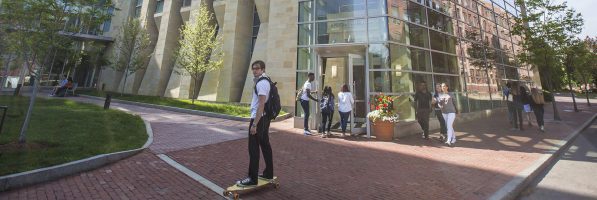MIT Faculty Director Explains Wave of “Alt” Jobs – Boston News

Let’s explore some of the most interesting stories that have emerged from Boston business schools this week.
How Transportation Disruption and Electric Vehicles Can Slash Greenhouse Gases – Questrom School of Business Blog
BU Questrom Professor of the Practice and Director of the university Institute for Sustainable Energy (ISE)’s Peter Fox-Penner and Research Fellow Jennifer Hatch recently co-authored new research with UC Berkeley’s Will Gorman, which illuminates how the car sharing, electric car, and autonomous vehicle trends could “lead to massive reductions in greenhouse gas emissions—without overtaxing the electric utility grid.”
Hatch explains, “Transportation emissions are 26 percent of the total emissions in the United States. We need to look at realistic ways to reduce those numbers. To significantly reduce greenhouse gas emissions, we know what we need to do: electrify the transport sector and decarbonize the electricity grid.”
You can find the group’s complete study on Science Direct.
Alt-Labor, Explained – MIT Sloan Newsroom
MIT Sloan Professor and Good Companies, Good Jobs initiative Faculty Director Thomas Kochan recently unpacked what he calls the emerging “alt-labor” movement.
“Traditional forms of union representation have declined to the point where advocates inside and outside the labor movement are searching for new strategies that work with today’s economy and workforce. Most of these new forms are working outside of what is considered traditional collective bargaining.”
Kochan adds, “Management had better start to listen to the workforce. And it better recognize that if it doesn’t start to look at more sensible forms of labor law, of labor policy, then it will be in a reactive position when the public does finally stand up and say enough is enough.”
You can read more about Kochan’s work here.
Restaurateur Partners with University to Battle Food Insecurity – Sawyer Business Blog
The Suffolk University Sawyer Business School recently profiled the CARES Pantry, a new initiative developed to address food insecurity on campus and give students access to healthier lifestyles.
Gene Lee, EMBA (’96), President and Chief Executive Officer of Darden Restaurants, who funded the initiative, says, “The goal is for every student in this University to be properly nourished, in and out of class, at work, and in their everyday lives.”

Gene Lee (’96) appearing at a recent event at Suffolk University / Photo via suffolk.edu
“It’s hard enough to be a good student in a competitive environment without having to worry about your next meal. The pantry will provide students with a safety net and a place they can count on and that they deserve.”
You can read more about Lee’s appearance at his alma-mater and the CARES Pantry here.
How To Create Your Own Internship, and More – Boston News

Let’s explore some of the most interesting stories that have emerged from Boston business schools this week.
How to Land an Internship That Doesn’t Exist Yet – D’Amore-McKim Blog
The D’Amore-McKim School of Business at Northeastern University recently published an account of how Matheus Dos Santos, DMSB ’19 created his own internship at Brazilian bank branch Banco Bradesco.
Dos Santos, a Brazilian native, sought out an internship at Banco Bradesco as an opportunity to “learn more about the industry” while he spent his summer back home in between his first and second years at D’Amore-McKim.
Dos Santos reports, “When I was talking to them about a summer job, they didn’t have any process in place. They weren’t sure at first how to hire me formally, and since I’ve started, all sorts of people have come up to me to say that I’m the first one the bank has hired for this kind of position.”

AP Photo via Victor R. Caivano
Dos Santos helped Banco Bradesco “develop an online trading platform to reach millennials.” Edilson Fontenele, head of customer experience at Bradesco and Dos Santos’ supervisor, writes that Dos Santos’ appeal was his unique perspective as a “millennial who knows the Brazilian environment and also had exposure to international markets.”
You can read the full article here.
The Big Leap – Sawyer Business Blog
Sawyer Business School student Jennifer Wiens writes candidly about the precise moment she decided to transform her life and career. After being laid off from her job at a Seattle biotech company, Wiens chose to move cross-country to Boston in part to “go where the jobs were” but also because she thought Sawyer “could help me capture that sense of control in my career.”
Wiens simultaneously began her Sawyer EMBA and a stint as Charles River Labs’ global product manager where she coordinated “multiple teams and meeting with clients all around the world.” She writes about how the two fed into each other.
“Because of my Suffolk experience, I don’t feel like I’m out of my element. I’m explaining business concepts to people who’ve been in business for 20 years. I’m teaching them current approaches to certain things.”
Then Wiens pulled another 180 by leaving the Charles Rivers Lab gig. As part of her EMBA capstone course, she created a business strategy and marketing plan for Advanced Dental Sleep Medicine, which offers “alternative, non-surgical ways to reduce sleep apnea.” According to the article, both of which worked so well that the “owner convinced her to leave Charles River Labs and come work for him [as] full-time employee number three.”
Wiens writes, “The company’s gotten a lot of good buzz, so the business is poised to explode and franchise out. And that’s where I come in.”
You can check out the full article here.
3 Steps Toward Safer and Sounder Software – MIT Sloan Newsroom
Deutsche Bank CIO and head of safety and soundness Frédéric Véron recently gave a talk at the MIT Sloan CIO Symposium, where he shared 3 pieces of wisdom for making software “safe and sound.”
Véron said “safe and sound” software is about a “mix of hyper-awareness, good planning and foresight, and learning quickly from mistakes.”
According to the article, “hyper-awareness” involves knowing “how all your software is actually being used day-to-day, ensuring all stakeholders in development understand the full scope of the product, and continuously taking baseline metrics to understand what can be considered normal operating conditions for a system.”
Good planning and foresight entails that “all of the different procedures that will be necessary to maintain the system in production mode need to be thought through ahead of time. You can always bolt it all on later, but it will cost you more money and it won’t be native or work as well.”
Véron advocates “failing and adapting fast” by adopting agile and DevOps. “The whole point of agile is about adopting the philosophy where you break down major efforts into smaller efforts, allowing you to do incremental releases so that you can make a small change, and if it isn’t working you can pull it out of production quickly without impacting the whole thing.”
He elaborated, “Safety and soundness is about ‘How do we make the enterprise safer and more sound, right from the get-go?’ Not just when things happen, but before things happen.”
The full article can be found here.
MIT Talks to Costco CEO About Success, and More – Boston News

Let’s explore some of the most interesting stories that have emerged from Boston business schools this week, including a visit from the Costco CEO at MIT.
How Costco’s Obsession with Culture Drove Success – MIT Sloan Newsroom
Costco CEO James Sinegal, along with renowned Costco butcher Todd Miner, stopped by professor MIT Sloan Zeynep Ton’s “Management of Services: Concepts, Design, and Delivery” class earlier this month to discuss how Costco’s employee-focused culture was “critical to its success.”
In Ton’s 2014 book, “The Good Jobs Strategy,” she analyzed four “operational choices” that she believes Costco’s culture encapsulates—and are responsible for its status as a “wholesale giant.
- Offer less
- Standardize and empower
- Cross-train
- Operate with slack.
Sinegal explained that the key to Costco’s success is a culture that promotes “passion, integrity, ownership, and motivation in his employees and [ensures] that the customer can trust that they are always getting the best deal by shopping with Costco.”
He also highlighted the company’s well-known high-pay for its employees; among the best in the U.S. for retail workers.

“No one was going to be able to say we’re making money off the backs of our employees, because we were going to pay the highest wages in all of retail,” Costco CEO James Sinegal said.
Click here to get more insights from the Costco CEO.
The Evolution of Conflict Resolution – D’Amore-McKim Blog
Northeastern University D’Amore-McKim School of Business assistant professor Christoph Riedel recently published new research that offers insights into the social and biological evolution of how humans resolve conflict.
In “Conflict and Convention in Dynamic Networks,” Riedel researched how “dynamic networks allow individuals to resolve conflicts by managing their network connections rather than changing their strategy.”
His team applied computer simulations to common situations like when a single appetizer remains between a host and a guest. Riedel writes:
“Host-guest norms or ‘paradoxical behavior’ account for the vast majority of our simulated final state solutions—in other words, the host gives the guest the last appetizer. The opposite solution where the host takes the appetizer for himself, called ownership norms or ‘bourgeois behavior,’ is quite rare. This is especially interesting in the context of human biological behavior because in the animal kingdom, territoriality or ownership norms are ubiquitous.”
You can read more about Professor Riedel’s research here.
How Companies Can Use the Data They Collect to Further the Public Good – Harvard Business Review
HBS professors Edward L. Glaeser, Hyunjin Kim, and Michael Luca published a marketing piece in which they implored companies that collect data to recognize the possibility of “re-purposing their data for the public good,” which can allow companies to “do well by doing good.”
“[There is] broader potential for data from online platforms to improve our understanding of all of America. Just as Yelp can shed light on local economic changes, Zillow could inform our understanding of housing markets, LinkedIn could provide insight about labor markets, and Glassdoor could teach us about the quality of employment options in an area.”
You can check out the full article here.
Where Toys R Us Went Wrong, Sawyer International Business Etiquette, and More – Boston News

Let’s explore some of the most interesting stories that have emerged from Boston business schools this week.
Here’s What Sunk Toys R Us – MIT Sloan Newsroom
Experts from MIT Sloan offered a few choice insights into what Toys “R” Us, whose future currently remains in flux, could learn from the hiccups along its 70 year-long history.
Senior lecturer in work and organization studies Peter Kurzina writes that Toys “R” Us “ignored Amazon eating their lunch, thus failed to prepare and meet the challenge of competition.”
Associate professor of finance Andrey Malenko, a fellow MIT Sloan colleague, also critiqued the toy giant’s enormous debt burden. “If you’re running a business that might be sensitive to e-commerce, to the recession, then loading up on debt as much as [Toys “R” Us] did, it’s very risky and you probably shouldn’t do it.”

In March 2018, Toys “R” Us announced it would be closing all US and UK locations.
Read more of the duo’s analysis here.
International Business Basics – Sawyer Business Blog
The act of doing business across cultures often entails unexpected byproducts that Sawyer addressed in its recent “Business Protocol Across the Globe” forum, organized by Colombian native Laura Reales, BSBA ‘18.
“What if I wanted to move to another part of the world, like Saudi Arabia or France or China? How could I make connections with people so that I don’t look ignorant of their culture? So I decided to create a space where it was ok to talk about those differences.”
Read here to learn the answers to questions like, “What’s the proper way to present a business card in China?” and “What’s a good way to begin a negotiation in Turkey?”
Alumnus’ Company serves the Housing Needs of a Vulnerable Community – D’Amore-McKim Blog
The Northeastern University D’Amore-McKim School of Business profiled alum Andy Rosenthal, a 2007 alum who abandoned a lucrative career in hedge fund software to co-found the Terenbinth Group, which has become the “largest, family-owned provider of housing to people with intellectual and developmental disabilities.” Rosenthal explains his company’s model.
“We’re a real estate company focused on providing quality, safe, affordable housing to a vulnerable community,” Rosethal said in the interview. “In short, we find homes, fix them up, customize them to suit the tenants—think wheelchair accessibility, replacing door knobs with door levers, waterproof flooring, installing roll-in showers, etc.—and then rent them directly to the individuals.”
The company’s 68 homes currently accommodate more than 225 people across the state of Indiana and it’s looking to expand. You can learn more about the Terebinth Group’s plans here.
What are the Best Real Estate MBAs in Boston? – MetroMBA
Earlier this week we highlighted the three strongest Boston metro schools that can help you earn your way into the real estate industry: Harvard Business School, MIT Sloan, and the Babson College F.W. Olin Graduate School of Business.
Regarding Babson, writer Jillan Markowitz writes:
“At Babson College’s F.W. Olin Graduate School of Business, MBA students can pursue the finance concentration, which offers several courses in real estate. Students can rake courses like Real Estate Financial Modeling, Real Estate Fundamentals, or Real Estate Development. According to recent Olin graduate employment statistics, 10 percent of the 2017 MBA class landed jobs in real estate. This number may not seem overwhelming, but it dwarfs the percentage seen in many MBA programs (usually about two to three percent).”
Learn more about the best real estate programs in Boston here.
